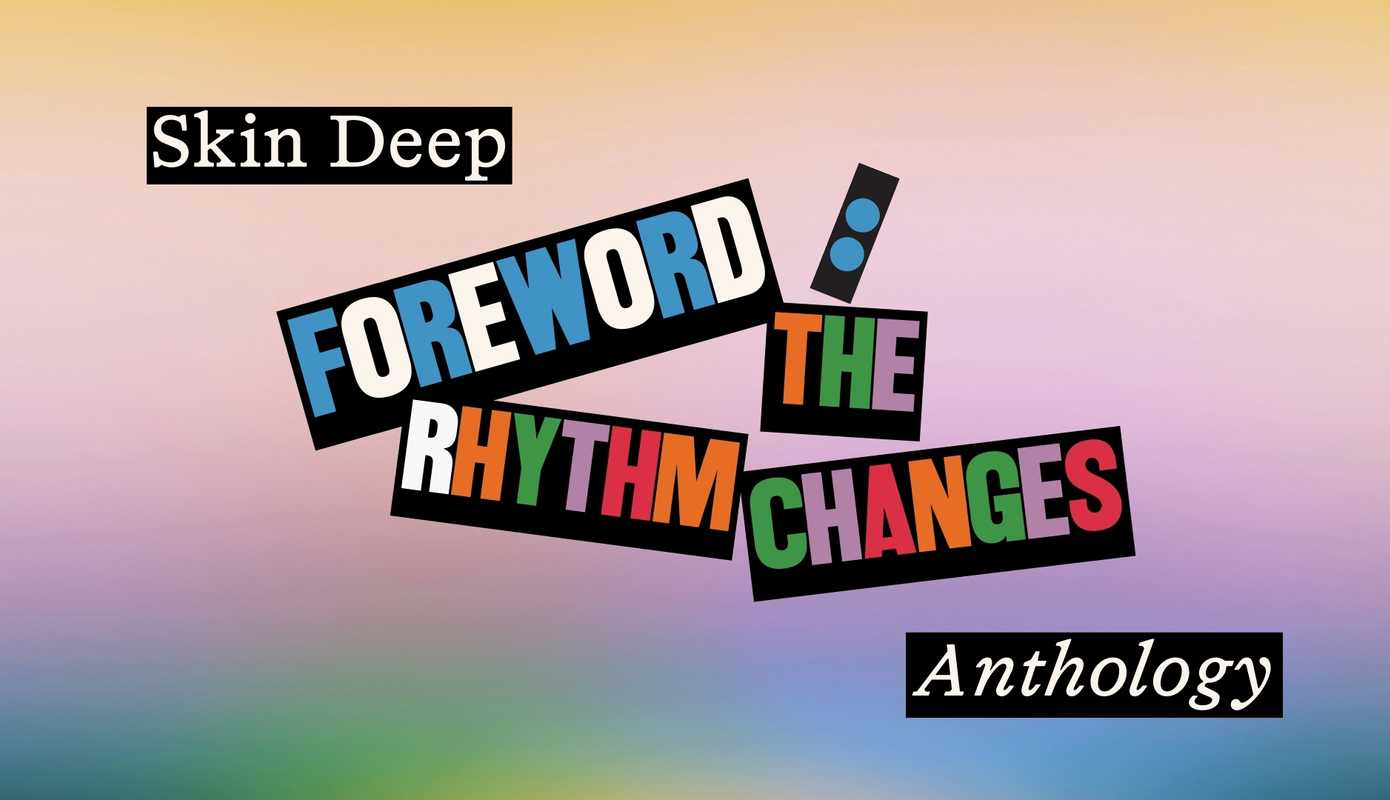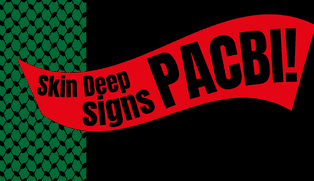An anthology is supposed to be a ‘best of’, the definitive or canonical selection, but the publication you hold in your hands would never pretend to know anything definitively – least of all which of the articles, essays, interviews, features, poems, illustrations and artworks Skin Deep has published over the last ten years is the best. We love all our children equally.
This is a collection of stories – some taken from our archive, some newly commissioned for this special edition – in which past, present and future interrupt each other. We like this messy cross-talk; it feels convivial, familial. Our anthology is a noisy, time-travelling miscellany. Or a compilation album: Now That’s What I Call Skin Deep! (double CD). Or, to borrow a Haitian term, a “rasanblaj”, meaning assembly or regrouping (of ideas, things, people, spirits). It is an unruly retrospective in which looking back and looking forward can be the same – and are not the only options.
Founded in 2014 as a Facebook group for students to discuss issues surrounding race (before quickly moving into mediums with fewer reply guys), Skin Deep has grown into a London-based, globally-focused arts and culture organisation working in service of racial justice. In 2024, we celebrated 10 years of producing and supporting creative work at the intersection of culture and liberatory politics. In that time, we’ve produced ten print magazines, published countless online stories, and gathered thousands of people together for live performances, discussions, workshops, dances, protests, meals, screenings, you name it.
To mark ten years, we wanted to do something special. This anthology is a celebration; a ritual marking of the passage of time; an entry in the historical record; and an opportunity for reflection. It is a long-exposure photograph of a ten-year slice in time, in which each shift made by the moving world leaves ghostly trails of colour and light that show where we have been.
It is also an opportunity to ask: how long does it take for things to change? Ten years feels like a long time, but the struggles we are a part of span far longer. It felt important as we hit double digits to zoom out and try to understand the actual timescales on which movements for justice operate, an exercise that can help us sustain hope over long periods of what can feel like failure. Change, when it comes, can seem sudden – but moments are always protrusions from much longer happenings, just like mushrooms springing up in autumn are the temporary fruiting bodies of impossibly huge, sprawling fungi that have been growing beneath the surface for centuries.
So the broad theme of this anthology is time: how we experience it, how it controls our lives, and how it can be reconfigured. We want to unravel the false notion that the temporal regime we live under now – one rooted in the earliest establishment of racial capitalism – is the only option. The stories collected here, whether pulled from our archive or newly commissioned, are all about rhythm, pacing, cycles, retrospection, inheritance, time travel, memory and archiving.
The first print issue of Skin Deep was born out of a desire to archive the experiences of students of colour at an institution (the University of Oxford) in which those experiences were historically and systemically erased (see the “Brief history of Skin Deep” for the tea). Archiving remains important to us, and emerges in stories throughout this anthology. So much is lost because it isn’t considered worth keeping by those with the power to decide what lasts; we are lucky that our predecessors created and kept all kinds of archives – formal and informal, public and underground, in many different mediums – that meant their ideas could make their way to us. Archives serve as lines of communication with our comrades across time; by enabling us to pass vital information through history, they collapse linear time and turn ancestors and descendents into allies in shared struggles.
When we were coming up with the theme, during Israel’s genocidal war in Gaza and throughout occupied Palestine, at the forefront of our minds was the question of how to balance the vital urgency of the moment with the need to maintain sustained opposition in a struggle that has lasted a century. As such, another key idea considered in this anthology is pacing, particularly as it relates to activism and revolution.
The anthology also explores ideas around lineage, ancestry and inheritance, in both personal and political ways. In a culture too often obsessed with being the first or the only, we’re proud to say that we’re neither; we are part of a long lineage of radical grassroots publications on culture and politics whose vital work has influenced our own, such as the West Indian Gazette, Black Dimension, Black Phoenix, Third Text, FOWAAD, Ten.8, and Race & Class.
When it came to reproducing archive pieces, we have chosen to leave them as close to the originals as possible, even where they contain ideas or language that no longer feel right to us in the present day. You will find, for example, that in pieces written before 2020, we do not cap up the ‘B’ in ‘Black’, which we retained in recognition of the ever-evolving nature of language. (There were, however, some artefacts that we decided not to reproduce, like how we misspelled bell hooks’s name as “Belle Hooks” in one of our early issues. Yikes.)
Turning 10 has made us look back, not just at ourselves, but at the world around us. A decade is a long time, and no time at all. We are not historians, and it feels like a mug’s errand to try and summarise what the salient narrative of a decade has been when you’re still at the tail end of it. Still, for the benefit of future historians, this is roughly what 2014-2024 looked like to us, from where we were standing, at the core of a dying empire:
Black Lives Matter, Rhodes Must Fall, the Umbrella Movement, Standing Rock, identity politics, diversity and representation, Ebola, Covid, lockdowns, noticeably more fascism, noticeably more billionaires, war in Syria, war in Sudan, the hostile environment, Prevent, Brexit, something mad like eight UK elections in a row, fields of wheat, rapidly fading faith in social media, everyone has a podcast, everyone has a newsletter, the rise of burnout, the fall of skinny jeans, ice bucket challenge, cancel culture, Weinstein, Epstein, #MeToo, was Megan Markle silent or silenced?, intersectionality, culture wars, cultural appropriation, SJWs, Pizzagate, pizza rat (no relation), Solange and Jay Z in the elevator, JK Rowling went off the deep end, same with Kanye, the Paris Agreement, floods, fires and rising seas, Kendrick said we gon’ be alright, MAGA, covfefe, the gig economy, marriage equality, ChatGPT, Stormzy and Maya Jama, Fyre Festival, drill, doomscrolling, Edward Colston took a swim in Bristol harbour, #OscarsSoWhite, the UK jazz renaissance, an arts funding landscape that is truly hell (and we’re one of the lucky few that actually has some core funding), the passing of Toni Morrison, the passing of bell hooks, Grenfell, Sisters Uncut, the Essex 39, Windrush, post-9/11 Islamophobia still going strong, wage stagnation, rent rises, food banks, venues disappearing, the wellness industrial complex, ACAB, #Exxonknew, Russian interference, populism, strongmen, small boats, fortress Europe, live-streamed genocides, “I can’t breathe” 11 times, always the insistence that we return to liberalism or centrism even though it isn’t working, no justice no peace, from the river to the sea.
It doesn’t all look great, on reflection. But through the constant low-level feeling of the end of days, Skin Deep has been a light in the dark, a space for radical imagination and rehearsing different ways of being. The friends and family we have made through this project have kept us from giving up.
With this issue, we set out to ask big questions about how long it takes to change the course of history, to overthrow empires, to end capitalism. Obviously, we have not answered those questions. But in each of these pieces is some wisdom for those who must keep on fighting through what artist and writer Fargo Nissim Tbakhi has called “the long middle of revolution”; some sustenance to keep at bay the despair of not being able to see the finish line.
In a way this magazine is a family history; so many of the contributors to this issue have been instrumental in shaping Skin Deep from its earliest days right through to now, and are friends of this project and the people behind it in the truest sense. We toyed with the idea of a thank you list that would include the names of everyone we have worked with over the last ten years, but we knew that there was no way we could avoid missing people out. So instead let us just say, to every artist, musician, writer, filmmaker, photographer, poet, producer, performer, designer, editor, organiser, activist, educator, mentor, auntie and community leader we have had the honour of collaborating with over ten years: this is something you have made.
We believe that culture shapes reality; the stories we tell about our world make it. That’s why our interconnected struggles for justice need a flourishing cultural and creative ecosystem; as much as we need front-line defenders, academics and researchers, activists, organisers, teachers, healers and fundraisers, we need storytellers. And we need independent arts, culture and media spaces where artists of all kinds can make work that contributes to the creation of a just and liberated reality without fear of censorship, without the pressure to choose between serving the status quo or being defunded.
Music has always been at the heart of Skin Deep, so it feels right for our final note to come from a musician.
In August 2017, when the skeleton of Grenfell Tower still stood blackened and bare over North Kensington, musician and long-time west London community activist Niles “Asheber” Hailstones was interviewed by writer Christian Adofo for the Skin Deep website. Official relief efforts after the Grenfell Tower fire were fizzling out, and community organisations – who had long, bitter experience fighting against the greed of developers and the apathy of the state in the area – were picking up the slack: rebuilding lives, providing much-needed care, and starting what would be a long struggle for justice. “We’re energised and working to keep the truth on the table and to make sure that we get justice,” Asheber said. “Justice not just for the crime that was committed, but justice in the sense that we want to change the rhythm of the way things happen, because as the rhythm changes, so does the dance.”
Asheber’s words remind us that to change the world, we have to change the structure, the deepest, most essential element: the beat to which the world moves. We invite you to tap into the rhythm, and change it. It’s all about timing.
Georgie Johnson, with Skin Deep and the Anthology team (January 2025)



.png)
